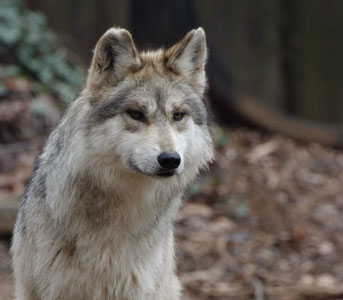Op-Ed: In the age of extinction, we need wolves

This year’s catastrophic events have laid bare the interconnected nature of human and nonhuman life. Whether it was dead birds raining down or choking plumes of smoke from historic wildfires obscuring the sun, we have experienced melancholic reminders that our oft-overlooked corner of Northern New Mexico is not immune from regional and global changes in our climate and society.
You’ve heard it before and may be tired of hearing it. But we cannot deny that we are living in the Anthropocene, which literally translates to age of humans but has increasingly been described as the age of extinction. Exacerbating this sad human legacy, the U.S. Fish and Wildlife Service is removing Endangered Species Act protections for gray wolves.
Gray wolves are far from reaching the terms of recovery defined by the Endangered Species Act, which assesses the status of a species based on their presence or absence in “a significant portion of its [historic] range.” Wolves are missing from vast stretches of suitable habitat, including the mountains and forests of Colorado and Northern New Mexico. The Fish and Wildlife Service claiming a premature success is akin to George W. Bush’s infamous Mission Accomplished speech. The war continues.
The federal government’s abuse and misuse of the law — not to mention their ignoring of science and public input that supports continued protection — not only throws wolves under the proverbial bus of politics but also threatens efforts to protect other imperiled species and the environment broadly. The Endangered Species Act is not the only law to be attacked in the last four years. The Migratory Bird Treaty Act, 2015 Clean Water Rule, National Environmental Policy Act and many others all need to be restored and strengthened in the next four years.
When delisted, gray wolves will be subject to the slings and arrows of outrageous fortune, also known as state wildlife agencies. Without federal protections, wolves will be in the crosshairs of every state in which they currently struggle to exist.
They will not be allowed to thrive or expand beyond the 15 percent of their historic range that they currently occupy. Years of act protections succeeded in getting them to that 15 percent — which is an optimistic estimate at best. During this period, multiple attempts have been made to delist this iconic species. Each time, the state agencies responsible for wildlife management showed just what they thought of wolf management: an opportunity to continue onward in the age of extinction. Following delisting, wolves will be subject to killing contests, trophy hunting and trapping — the very activities that led to their near extinction.
If we are harbingers of extinction, wolves are messengers of biodiversity. Sometimes, such as the recovery of Yellowstone’s wolves, we are able to measure astounding trophic cascades, where apex predators influence every level of the food web and increase species from beavers to birds. Other times, we simply see wolves contributing their part to the health and vitality of myriad wild and working landscapes. Wherever they go, the wild world that sustains us is better for it.
We are sustained by this wild world, not just as a refuge from cities and places to go hiking. It is also a source of so many essential ecosystem services — from clean water to pollination of our food — and a sink for our carbon and other pollutants. When we forget this fact, we suffer with zoonotic diseases, catastrophic wildfires and hurricanes — an outrageous fortune of our own making.
I used to wonder in happy awe at the John Muir quote: “When we try to pick out anything by itself, we find it hitched to everything else in the universe.” Now I’m more likely to shudder, thinking of us picking out wolves and losing everything wild with them.
Michelle L. Lute, Ph.D., is Project Coyote’s National Carnivore Conservation Manager and lives in Santa Fe. Visit ProjectCoyote.org for more information.
~~~~~~~~~~~~~~~~~~~~~
This Opinion piece was published in the Santa Fe New Mexican.



